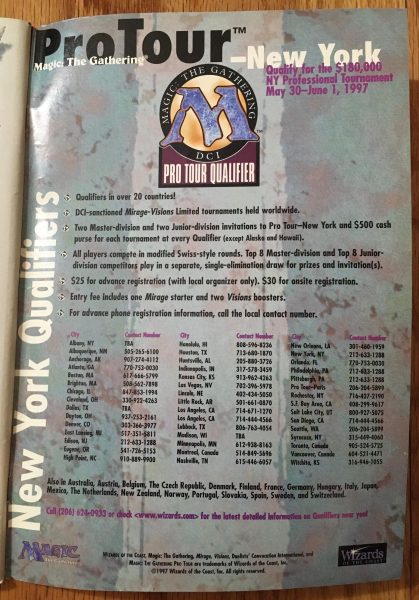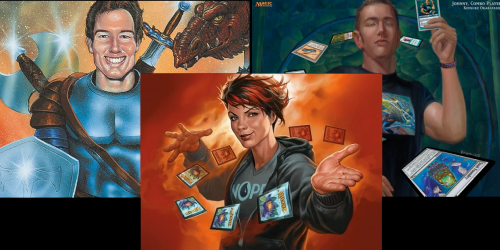Are you a Quiet Speculation member?
If not, now is a perfect time to join up! Our powerful tools, breaking-news analysis, and exclusive Discord channel will make sure you stay up to date and ahead of the curve.
The Showdown In New York
"The place: New York City. The time: February 17th and 18th of 1996. The Event: The very first tournament of the Magic: The Gathering Professional Tour." These sentences are the opening narration to Showdown In New York a promotional video made by Wizards of the Coast covering the players, stories, and action of the first Magic Pro Tour. Released on VHS tape in the '90s, and now on YouTube, the video interviews and follows a number of early Magic personalities through the events of the tournament.
In addition to the interviews and stories, Showdown in New York presents highlights of some of the first high-level Magic played on camera, with commentary. 25 years later, it's an interesting snapshot not just of Pro play, and the then brand new Standard format (called Type 2 at the time), but of the nascent Organized Play program generally.
The Origins of Magic Organized Play
Major Magic tournaments, including the first Magic World Championships, happened as early as 1994. In 1996, seeking to capitalize on the massive interest in the game, and prevent it from being just another fad of the '90s, Wizards launched an Organized Play program seeking to retain players. The brainchild of Wizards Lead Events Designer Skaff Elias, it began with a series of professional tournaments, of which the Showdown in New York was the first of four for the year.
While the first Pro Tour (PT) was open to a limited number of players who called Wizards on the phone to register, invites to future PTs were handled through a qualification system. To qualify, players either needed a good finish in a previous PT or to have won a Pro Tour Qualifier (PTQ) tournament.

The Pro Tour was as much a promotional tool as it was an arena for the best players in the game to slug it out over the table. This led some to jokingly refer to it as the "Promotional Tour." Competitive play would be the focus for most of Wizard's marketing and OP efforts throughout the '90s and into the 2000s. It was quickly apparent though that with the advent of the Pro Tour, another type of event structure was needed to bring players from the kitchen table to the tournament hall.
From Casual to Competitive
Seeking to bridge the gap between casual play and the competitive play of the Pro Tour, Wizards unveiled the Arena League at the 1996 Origins game convention in July. Played primarily at the local game store (LGS) level, Arena League offered competition, but in a more relaxed setting and with lower stakes. As interest in Magic and the demand for more events continued growing, Wizards quickly added more events to the calendar.
Grand Prix
In March 1997, the first Grand Prix was held in Amsterdam, Netherlands. Grand Prix are professional-level events, but open to all players. In addition to cash prizes, the perks of doing well at a Grand Prix include invites to the Pro Tour for the Top 8 finishers. There were ten Grand Prix held in 1997, five associated with the 1996-'97 Pro Tour season, and the remainder associated with the '97-'98 season. The number of Grand Prix would increase over time to 50-60 at the peak of Magic Organized Play, as did the attendance numbers. The largest Magic: The Gathering tournament ever held, was Grand Prix Las Vegas in 2015, with a record 7,551 players in attendance.
Friday Night Magic
In 2000, Wizards launched one of their longest-running and most successful OP initiatives: Friday Night Magic. Taking place every Friday at the LGS, Friday Night Magic offered regular local competition, and prizes in the form of promo cards. The formats allowed for FNM have varied over the years, but the two most common FNM formats are Standard and Draft. Thanks in part to the overwhelming success of FNM, Arena League was phased out in 2007. Today FNM remains a core part of Magic OP and a driver of support for local game stores.
The Evolution of Organized Play
Updates to the PTQ system
As Magic has grown and evolved, Organized Play has evolved with it. By the 2010s, Pro Tour Qualifier tournament attendance had grown so large that PTQs became all-day events. To streamline the system and bring LGSs into the action, Wizards introduced a new system in 2015. LGSs now had the ability to run Preliminary Pro Tour Qualifier tournaments (PPTQs). The winners of those events gained invites to Regional Pro Tour Qualifiers (RPTQs). In many ways, RPTQs were the equivalent of the old PTQs, but the invite-only system, in theory, shrank attendance numbers to make running the events more manageable.
MagicFests
Like the PTQ system, Grand Prix events also received a makeover in 2018. Rebranded as MagicFests, these weekends still played host to the Grand Prix main event, but now placed extra emphasis on side events and other qualifier events. Pro Tour events, rebranded as Mythic Championships, would also take place on certain MagicFest weekends.
The Growth of Commander and Casual Play
In the 2000s, the casual format Elder Dragon Highlander took off in popularity. Even the staff at Wizards got hooked on the format. Sensing something big, the company quickly collaborated with the EDH Rules committee, who oversaw the format, to make EDH an official Magic format, rebranded as Commander. In addition to making the format official, Wizards began releasing products meant specifically for the format starting in 2011. Today, Commander is by far the most popular Magic format. In 2019, the popularity of the format led Wizards to introduce CommandFests. These were Commander-specific Magic events similar in scale to MagicFests. The introduction of CommandFests was not the only change to Magic OP in 2019.
eSports and Organized Play
In 2019, Wizards of the Coast upended their entire Organized Play system with the introduction of the Magic Pro League, which included a Wizards-paid salary for participating. This new competitive-OP system put an emphasis on eSports revolving around their new Magic Arena platform. In 2020 they added a new league below the MPL called Rivals League for players competing to rank up to MPL status. This new system drew ire from the community in part because the path to qualify for these leagues was more convoluted than the old system.
There was also a decided lack of communication from the company. Magic fans couldn't figure out when & how to watch these pro leagues, never mind qualifying to play in them. The push to eSports was also a strange move for a company whose software lacked basic functions like a spectator mode. That situation was short-lived, as the pandemic and lockdown brought all OP to a grinding halt.
Organized Play and the Pandemic
The fumbled push into eSports combined with the pandemic shutdown meant no OP. As players sheltered at home though, many turned to Magic Arena to satisfy their gaming needs or continued to play casually otherwise. Despite the shutdown, and no events happening, 2020 and 2021 were two of Magic's biggest-selling years. Magic's popularity is clearly huge, so what does this mean for the future of Organized Play?
The Future of Organized Play: Back to "The Gathering"
As lockdowns ended, and in-person play slowly resumed in parts of the world, the future of Magic OP was in the back of many players' minds. In a May 2021 Article on Magic.gg "Esports: Transitions and Getting Back to Gathering," we got a hint of what the future of Magic OP may look like. The introduction to that article read:
"As the world looks to a post-COVID future, so too are we looking toward the next iteration of Magic's competitive play system—one that recaptures the magic of the gathering we've all missed so dearly while expanding play opportunities to a wider audience."
They elaborated on what they meant in that opening by providing these points for what a future OP system might look like:
- In-person play is a unique strength for Magic, and we need to lean into that. That means local tournaments, large regional tournaments, and high-level in-person events.
- Digital play is here to stay but is only part of the equation. We've seen great players rise from the digital ranks, and we've seen what's possible with digital events. Expect the future to hold a mix of digital and in-person events.
- Accessibility is important, and that means broader access to play. We're looking at everything, from local events and the success of CommandFests to creating even more levels of play that are open to a broader swath of players. A larger audience means more types of events.
Those all sound like reasonable points, but how could that play out in practice?
Theories on What Future Organized Play Will Look Like
Wizards will be unveiling their new Organized Play program on March 31st with an article and subsequent stream on WeeklyMTG. These are my expectations for that new program:
- Competitive-play program with qualifiers at the LGS level leading to larger regional and/or national events.
- Strong ties between competitive-play and digital.
- More Commander and other casual-focused events at the LGS level.
- CommandFest/MagicFest hybrid events, but Commander is the primary focus, and other formats are secondary.
- Introduction of a new casual format, or a split of Commander into sub-formats.
- Competitive Commander as a new bridge between casual and competitive.
As much as it bums me out to say, I think the glory days of competitive Magic, at least as organized directly by Wizards, are firmly behind us. Now that they've realized that competitive play is not the driving force of sales, if it ever was at all, I think we will see an increase in OP events aimed at a casual audience. This will include events like the recent Commander Party events back in January. It's also possible we will see new casual events and potentially new formats added to the mix.
Competitive events will still exist. The model will likely have less emphasis on any kind of professional league or circuit. Instead, it will likely be more of a series of regional and national championships potentially feeding the world championship event at the end of the year. There will likely be a digital component to the process involving Arena play. Unconnected to this, I think there's the possibility that competitive Commander (cEDH) could see some OP support.
What Do You Want Organized Play to Look Like?
Magic means different things to different people. I played the game for several years before I got into competitive play. The competitive aspects are what drive me today, at least when it comes to constructed. As a primarily limited player, I love competitive sealed and draft but enjoy casual Cube and heads-up drafts like Winston and Winchester just as much. I recognize that limited in general is not really for everyone, but it's where I get the most enjoyment from the game. I hope whatever OP looks like, Limited will have support in the system.
How do you prefer to play Magic? How would you want OP to reflect your play preferences? What types of events would you like to see in the new OP system? Let me know in the comments or on Twitter.




